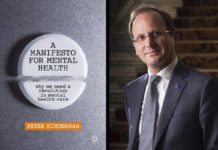Peter Kinderman – Why We Need a Revolution in Mental Health Care
An interview with Professor Peter Kinderman about his new book, A Manifesto for Mental Health, Why We Need a Revolution in Mental Health Care, in which he proposes a rejection of invalid diagnostic labels, practical help rather than medication, and a recognition that distress is usually an understandable human response to life's challenges.
Review of “Call me Crazy”: A play by Paula Caplan PhD
When I was invited to review “Call me Crazy”, written and directed by Paula J Caplan, a clinical and research psychologist, playwright, author, advocate, filmmaker and activist from the US, I was aware that this was the first play she had ever written and that it had won second place in a national playwriting competition.
Appropriate Responses to a Pandemic: How are Your Seven Emotional Systems?
Our safety systems have been alerted to differing levels since January 2020 when the coronavirus epidemic came to light. The appropriateness of this fear response needs to be highlighted, in part because it will protect us, and in part because we must normalise this response rather than viewing it as a ‘disorder’.
Fatherland Dreamland Motherland Hinterland
I grew up in Rhodesia, a British colony in southern Africa. Until the age of 16, I lived on the grounds of Ingutsheni Mental Hospital where my father worked. As a psychiatrist, he had enormous power.
Product Placement: Out of Sight and Out of Mind
It’s World Mental Health Day as we publish this. On this day, while we think of how it is good to talk and that 1 in 4 of us (at least) will experience mental health problems, let’s try to remember some other people too. Let us try to remember the people for whom we pay £200,000 a year to keep out of sight and out of mind. Let us consider whether life at all costs is worth forcing people to live in hell. Let us ponder whether our care can harm people.





